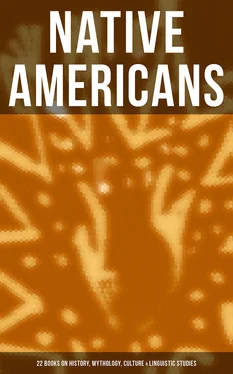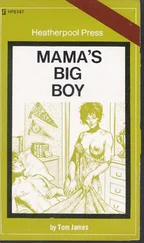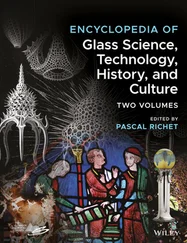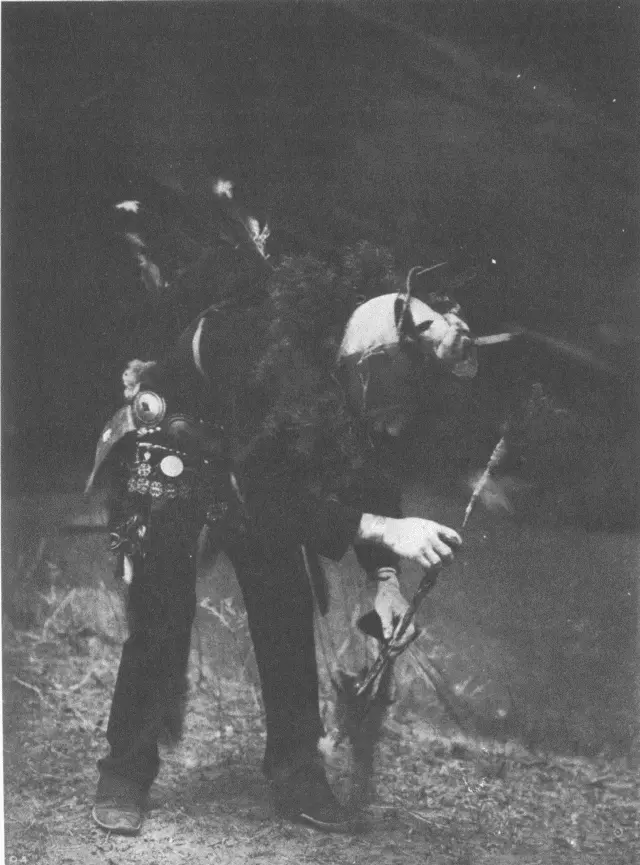
Ganaskĭdĭ - Navaho
This is the personation of the Navaho God of Harvest. The name signifies "Hunchback." He is represented always in a stooping posture, carrying a staff to aid him in supporting a burden of corn, bean, pumpkin, and other seeds which he carries upon his back. The personation is conventional, rather than literal, in intent.
The Sun looked into the lodge, saw that it was tight, and told the boys to enter. As they passed in Haschógan whispered, "Get behind the stone slab on the north!" Then Hasché̆zhĭnĭ rolled in several red-hot bowlders and closed the entrance tightly with heavy cloud blankets. White, blue, yellow, and black water was then thrown in, and there followed the sounds of the sizzling steam and bursting stones; fragments could be heard striking the walls on all sides. After a short while the boys heard the voice of their father call out from the east, "Are you warm?" They gave no response. He called again from the south, but received no answer; then from the west; all was silence. "Surely I am rid of them at last," thought he. He called once again from the north, and to his great surprise received a reply. The sweat-house had cooled enough to permit the boys to emerge from their hiding-place, so their cheerful voices came from near the doorway.
"These must be my sons," thought the Sun, and throwing back the blankets from the door he embraced them. "My children, whence came you and how did you get here?"
The story of their home at Tzĭlhnúhodĭhlĭ, of their long journey across land and water, and of the many obstacles encountered, was soon told. Then the Sun directed his wife and daughters to remould the boys and make them as handsome as themselves. When that was done all entered the house, where on the walls hung many beautiful strings of turquoise, abalone, white-shell, and jet beads, and plates of armor. These were offered to the boys, but they refused them, saying they cared not for jewels, preferring instead to have lightning arrows, strong bows, and heavy knives with which to battle with the giant alien gods who were destroying people in all parts of the earth. The Sun gave them the weapons desired, and when it came time to resume his journey across the sky he took his newfound sons with him.
Near Tsótzĭlh, the sacred mountain of the south, lived Yéĭtso, the Big God. The boys wished to try their skill on him first, so their father let them down from the sky upon that mountain. The giant was drinking from a lake and saw the reflection of his new enemies as they dropped upon the mountain. He straightened up quickly and sent an arrow aimed for the body of Nayé̆nĕzganĭ, but the boy dodged quickly and responded with a bolt of lightning which stripped the armor from Yéĭtso's feet. Three more shafts of lightning struck the armor from the hips, body, and head of this fiercest of giants, exposing his vitals to the attack of the boys, who filled him with arrows, killing him instantly. The Big God's blood began to flow down a cañon. Nayé̆nĕzganĭ drew a line across its path with his stone knife, and the blood ceased flowing onward, rising in a wall across the cañon's head, over which now plunges a beautiful waterfall.
The brothers then set off for home, taking the heart of their slain enemy with them. Arriving at Tzĭlhnúhodĭhlĭ they found their mother in tears, for she was certain that her boys had been killed and devoured by monsters. Though unchanged in size, so altered were they in appearance that Yólkai Ĕstsán could not believe them to be her own boys whom she was mourning as dead, but the story of their adventures from the time they had left home was soon told, and all rejoiced.
In the days following, Nayé̆nĕzganĭ and Tobadzĭschí̆nĭ made incursions into the lands of the alien gods, killing them all and freeing the earth from the dread and curse of these man-killing monsters. The first to meet destruction at their hands when they took up their deliberate search for giants was Déĭlgĕt, Giant Antelope, who had great blue horns upon which he tossed people to death. The next accosted was Tsĕ Nahálĭ, the preying Mountain Eagle, and soon after they sought and killed Tsĕtahídzĭlhtúhlĭ, Among The Rocks He Kicks Them Down The Mountain. Then Bĭnáyeaganĭ, Who Kills With His Eyes, met death, followed shortly after by Tsé̆agai, Rolling Bowlder, and Sŭsh Nalkái, Tracking Bear, the last to lose their lives at the hands of the youthful warriors, Nayé̆nĕzganĭ and Tobadzĭschínĭ, who have since remained the War Gods of the Navaho.
Legend of the Happiness Chant
Table of Contents
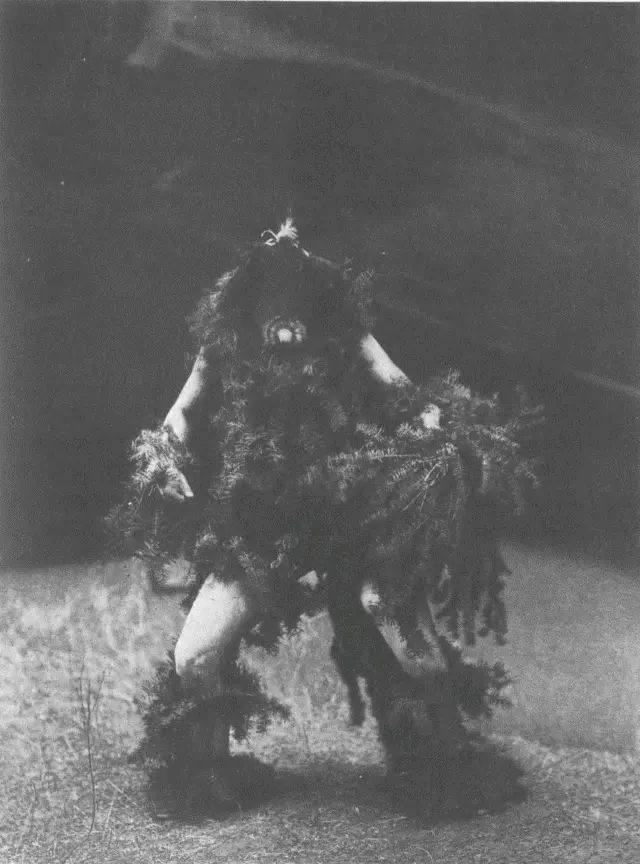
Tónenĭlĭ - Navaho
Tónenĭlĭ, Water Sprinkler, is the Rain God of the Navaho. He it is who sends the rain, the hail, and the snow, and causes thunder and lightning. The personator of this god in the ceremonies assumes the additional character of a clown and as such creates much merriment in the dances in which he appears. His apparel consists principally of spruce boughs and a mask.
The Hozhónĭ Hatál, or Happiness Chant, is a nine-days' chant held inside a hogán, and like many of the Navaho ceremonies, it was derived from another tribe. The myth relating to it tells of a renowned warrior who had two beautiful sisters whom he wished to see married, but only to men who should first prove their strength and valor in a feat of arms; so word was sent to all the young men of the warrior's tribe to gather at his home on a certain day, prepared for war, if they wished to enter a contest he would then propose. The girls being coveted prizes, a goodly number of warriors, painted and dressed in full war regalia, assembled on the appointed day, among them being two old, white-haired brothers, of an alien tribe, who had recently come to live near the Navaho people. The young chief protested at the presence of the old men, declaring that they would only sacrifice their lives in the first combat, for they could have no possible hope of success. The two persisted, however, and were allowed to remain in the van.
Four-days journey from the Navaho country was a village of the Áya Kĭnné̆, Have Holes For Houses, enemies from early times. They also prided themselves on having two very beautiful girls, upon whom many admiring young men of the tribe bestowed valuable presents of turquoise, shell beads, and other jewels. One of these wondrous beauties wore her hair plaited always with rich strings of turquoise; the other with strings of white shell.
"To the two men," said the vaunting young Navaho, "who will fight their way to the homes of these boasted beauties and bring to me their jewel-plaited scalps, will I give my sisters."
The band started, each man eager and hopeful, and on the fourth night bivouacked in sight of the cliffs under which the hated Áya Kĭnné̆ had their homes. At daybreak on the following morning they made their attack on the pueblo, but the villagers, ever alert and well prepared for an onslaught, offered desperate resistance, every man fighting bravely for his life and his family. All day long the contest raged; arrow, lance, and stone hammer dealing death on every hand. As nightfall shrouded the combatants in darkness, the invaders, depleted in rank, slunk back to their camp on the hill, where they found the two gray-haired brothers, each bearing a jewelled scalp as his trophy.
When the Navaho chief learned that the old men were the victors, he raged with anger, condemning his tribesmen and vowing that his sisters should never become the wives of unknown aliens, and accordingly declared a new contest. The man who would win a beautiful wife must hit the blade of a yucca plant with an arrow at forty paces. The long, narrow blade was hung in the bark of a tree and the contest commenced. The younger men shot first. One by one they twanged their bows, and one by one marched off in sullen humor. At last it came the turn of the aged brothers. The first shot his arrow, and the slender leaf was pierced; the second shot, and again the leaf was pierced; but so soon as the second arrow had hit its mark the Navaho declared a new feat, contending that this had not been sufficient. A long race was then arranged, and once more the brothers came off victorious.
Читать дальше
